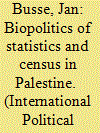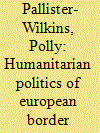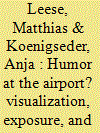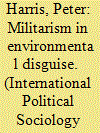|
|
|
Sort Order |
|
|
|
Items / Page
|
|
|
|
|
|
|
| Srl | Item |
| 1 |
ID:
137616


|
|
|
|
|
| Summary/Abstract |
This article addresses the importance of statistics for governing populations in the context of Palestine. On the basis of Michel Foucault's understanding of governmentality, I argue that social statistics represent crucial biopolitical technologies of governmentality. While statistical knowledge as a modern phenomenon originated in Western Europe in the late eighteenth and early nineteenth centuries, the case of Palestine clearly shows the importance of modern statistics beyond the OECD world. In a first step, I will elaborate on the emergence of social statistics as modern phenomena for governing populations. In this regard, the “discovery of the population” represents a fundamental prerequisite for the “birth of modern statistics” and the systematic utilization of statistical data for governing purposes. On this basis, I will argue social statistics are of crucial importance for governing the daily lives of the Palestinian population. Moreover, I will present the emergence of Palestinian statistics as a global phenomenon. It will become evident that social statistics and inferred demographic politics are essential for the sustainment of societal order in Palestine. This is particularly so regarding related inclusionary and exclusionary dynamics—namely Palestinian nation-building on the one hand and the Palestinian–Israeli demographic contestation on the other.
|
|
|
|
|
|
|
|
|
|
|
|
|
|
|
|
| 2 |
ID:
137615


|
|
|
|
|
| Summary/Abstract |
This paper explores humanitarianism in the practice of Frontex-assisted Greek border police in Evros and of Frontex at their headquarters in Warsaw. Building on the increase in humanitarian justifications for border policing practices as well as the charges of a lack of humanity, the paper analyzes the relations between humanitarian responses and border policing where humanitarianism is used for framing and giving meaning to institutional and operational practices. In offering an interpretive view of border policing undertaken by people in their working lives across sites and scales, it builds on the critical literature addressing the multifaceted nature of border control in Europe today. At the same time, it speaks to wider debates about the double-sided nature of humanitarian governance concerned with care and control. It argues that while humanitarian motivations have implications for operations in the field and help to frame “good practice” at the policy level, humanitarianism should not be seen as additional or paradoxical to wider border policing operations within forms of governance developed to address the problems of population. Conflict arises in the paradox of protection between the subject of humanitarianism and policing, the population, and the object of border control, the territorially bounded state or regional unit.
|
|
|
|
|
|
|
|
|
|
|
|
|
|
|
|
| 3 |
ID:
137614


|
|
|
|
|
| Summary/Abstract |
With the emergence of aviation as a target for terrorism and serious crime in the 1970s, the affective dimension of airport security changed drastically and is now carefully engineered as a zone of earnest and solemn protocol. Against a backdrop of bombings and hijackings, airport security today enacts a “no bullshit” approach to the “war on terror.” Humor has essentially been banned from screening operations. From signs reading “No bomb jokes, please,” to drastic consequences in the case of non-compliance, security appears as something that is not to be fooled around with. Against this background, this paper builds on ethnographic fieldwork at Hamburg airport during the German trial run with body scanners in 2011. During the time of observation, we found a surprising amount of reciprocal laughter and joking. We argue that this can be conceptualized as an attempt to break open a space for laughter, momentarily abandoning protocol in order to deal with issues of visualization, exposure, and shame which arise from the new focus on the fleshly anatomical body.
|
|
|
|
|
|
|
|
|
|
|
|
|
|
|
|
| 4 |
ID:
137610


|
|
|
|
|
| Summary/Abstract |
How are international phenomena rendered knowable? By which means and practical devices is international knowledge generated? In this article, I draw on the case of contemporary maritime piracy to introduce a research framework that allows these questions to be addressed. Arguing that the practices of international knowledge generation are poorly understood, I show how concepts from science and technology studies provide the tools to study these practices empirically. Relying on the practice theory of Karin Knorr Cetina, I introduce the concepts of epistemic infrastructures, epistemic practice, and laboratories and demonstrate how they facilitate interesting insights on knowledge generation. I investigate three “archetypes” of epistemic practices in detail and show how these generate knowledge about piracy for the United Nations. The three archetypes are the quantification practices of the International Maritime Organization, the interpretation work of a monitoring group and the network of a special adviser. The article introduces an innovative agenda for studying knowledge generation in international relations by focusing on the practical epistemic infrastructures, which maintain knowledge about international phenomena.
|
|
|
|
|
|
|
|
|
|
|
|
|
|
|
|
| 5 |
ID:
137613


|
|
|
|
|
| Summary/Abstract |
What is the relationship between militarized landscapes, especially overseas military bases, and the natural environment? Scholars have noticed that militarized spaces—permanent bases, demilitarized zones, live fire ranges, training areas, historical battlefields and so forth—are often accompanied by de facto nature reserves. Thus, the unparalleled seclusion that militarization imposes upon delineated geographic spaces can create safe havens for plants and animals that would otherwise suffer from human encroachment. Others retort that military activities cause severe damage to the natural environment. In this article, I problematize attempts to evaluate the environmental impact of militarized spaces in a way that divorces the natural environment from the broader web of social and political relations to which military activities belong. In particular, I argue that environmental issues often serve as “greenwash” to distract attention—lay, scholarly, and official—from the negative aspects of militarism, including instances of environmental degradation, the mistreatment of human subjects, and the perpetuation of colonial forms of government. To illustrate and buttress my argument, I present a detailed case study of the US military base on Diego Garcia in the British Indian Ocean Territory.
|
|
|
|
|
|
|
|
|
|
|
|
|
|
|
|
|
|
|
|
|